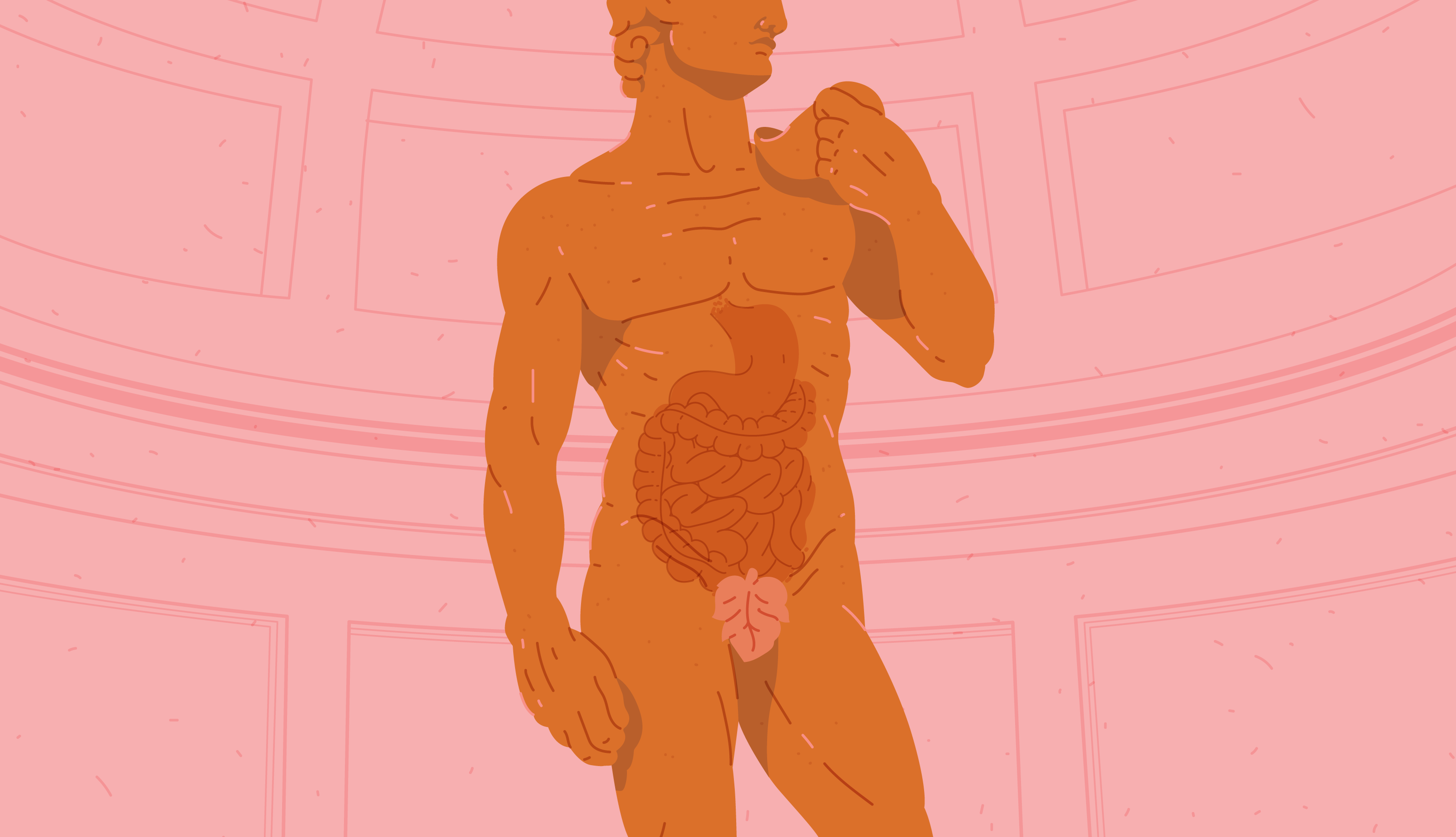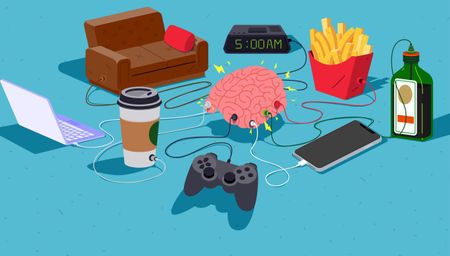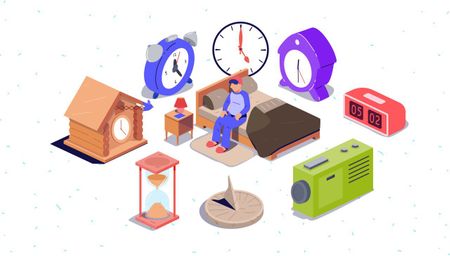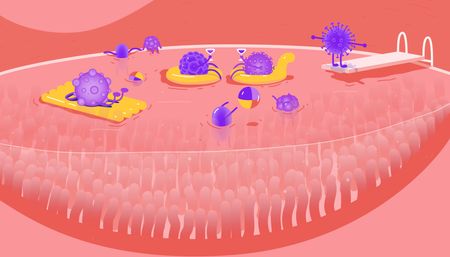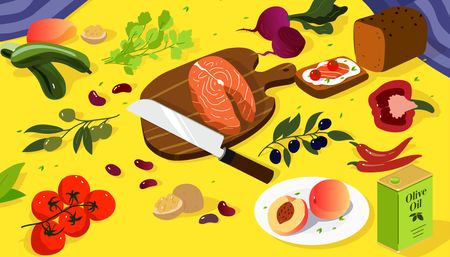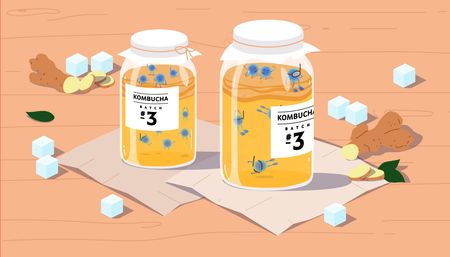The gut is not an impenetrable barrier: we all have leaky guts to some extent. But how much is too much and what to do about it?
Leaky gut isn’t recognised by clinical diagnostic books, yet it has become a catchall term for common digestive complaints. Here are some common leaky gut symptoms reported by people.
| Bloating, gas | Diarrhoea, constipation | Cramps | Food sensitivities |
| Aches and pains | Fatigue, headache, brain fog |
The gut is a complex organ, and there may be more at play than just a faulty organ. In fact, the gut is supposed to be “leaky” after meals - that’s how the nutrients get through. But there are a number of other factors that might cause your gut to leak longer than necessary.
In particular, your lifestyle and daily habits may be involved in this mysterious condition that leaves doctors dubious. We know this thanks to breakthrough findings in the study of your body’s biological clock and the gut microbiome.
In this article, we’re going to lay out some basic facts about your body’s mechanics, how your lifestyle influences your leaky gut symptoms, and why gut microbes may also be involved.
☝️DISCLAIMER☝️ Always consult a GP if you are concerned about your digestive health or experience acute digestive symptoms.
Inflammation and the gut’s immune system
The gut lining is an intestinal barrier that has two important functions: it selectively grants entry to some things, and acts as a gatekeeper to others, and it’s a pretty essential function that powers our human biology.
On the one hand, the porous structure allows nutrients, from our food and produced by our gut microbes, to enter the body and go where they are needed. But it also prevents toxins, food compounds, unwanted bacteria, and viruses from accessing the bloodstream where they can cause adverse reactions and infections.
We love this podcast about Inflammation with Dr Jenna Macciochi on the Doctor’s Kitchen
Doctors call this intestinal permeability and it has two main features. The first is a physical layer made up of cells and a mucous membrane that prevents large molecules from passing through it. The second layer is not visible to the naked eye: it is manned by the immune system to mount a response to threats using inflammation as its main weapon.
The gut is the main home of the immune response and has many cells dedicated to protecting the body because food and liquids are on uniquely intimate terms with our insides. It’s easy to forget, but what we eat and drink is not sterile. Far from it in fact.
The gut’s immune response has been honed by our gut bacteria from an early age, learning to recognise the usual inhabitants of this organ’s microbiome - and to respond when it detects activity that might be detrimental to our health.
Food and drink have been touched by hands, animals, and machines. Sometimes, it has been transformed by the action of microbes (like yoghurt). And, if it’s left out for too long in the wrong environment or exposed to a sick person, it could harbour viruses, opportunistic bacteria, or toxins produced by them that can make you ill.
Food poisoning is an excellent example of an acute immune response to something bad that we’ve ingested - inflammation helps shut down the permeability of the gut barrier, and triggers a number of responses to evacuate the invader, like vomiting and diarrhoea.
Under normal circumstances, tight junction proteins act as the gatekeepers of intestinal permeability - they allow the gut barrier to relax after meals so that nutrients can pass into the body. This naturally triggers a little inflammation that doctors call postprandial endotoxemia. Medical professionals don’t worry about it, so neither should you.
Photo by Gardie Design & Social Media Marketing / Unsplash
Eating naturally triggers gut permeability for about four hours after a meal
Postprandial endotoxemia lasts about four hours after a meal, during which time nutrients from the food and byproducts of our gut bacteria activities (good things like vitamins and short-chain fatty acids) get access to the rest of our body.
After that, the gut usually has other things to do, like repairing the intestinal barrier after the assault that is eating. After all, large chunks of food, hard bits, spicy foods and acidic beverages take their toll on the cells that line our digestive tract. It needs some love.
So even though a certain amount of permeability after eating is totally normal, too much permeability can be a bad thing. Snacking is a prime example of how normal intestinal permeability can morph into the catchall term leaky gut syndrome.
If you eat frequently, then your tight junction proteins never get to close the gates. Therefore your gut’s immune system is constantly stimulated and it reacts with low-grade inflammation to keep threats at bay.
Eat less, less often
Let's look at this from practical, non-medical perspective. Snacking and eating from dawn until dusk are modern inventions, but they're not something we’re designed for.
It’s probably no coincidence that digestive problems (and chronic diseases) have been on the rise in Western countries where eating regularly over a 16-hour period is the norm.
The Industrial Revolution is the likely source of these newfound habits. Workers needed to be fuelled so they could perform long shifts of hard labour. This is when our three-meal-a-day habit took root according to Dr. Jenna Macciochi in her article about leaky gut and snacking.
After all, most of human existence has been determined by our quest for sustenance, especially sweets: now we finally had access to an infinite supply of these gastronomic delights.
Before that, humanity ate significantly less frequently. It was dictated by seasons, cultural and religious rituals, as well as social norms. Hunter-gatherers ate when food was there. Winters came with alimentary restrictions caused by cold weather, limited access to game, and dependance on preserved foods.
Fasting for lent was traditional in Christian societies, and Ramadan is widely observed in Muslim culture, a religious celebration that forbids eating and drinking during daylight hours. On the European continent, breakfast was often a symbolic affair consisting of just a piece of bread and a sip of alcohol for many centuries.
Your gut is on a timer
Our lifestyles may have changed immensely over the last two centuries, but our biology hasn’t. This has been demonstrated by researchers in a field called chronobiology. They study the body’s circadian rhythm, which is essentially the body's natural clock.
Basically, scientists have discovered that our body contains 20,000+ genes responsible for turning on and off biological processes of the body in order to keep us optimised and healthy.
Research into intermittent fasting and time-restricted eating by Prof. Sachin Panda, an eminent researcher in this field, has revealed astounding findings in how the window of eating we observe during the day can affect these diseases.
As mentioned, nowadays we tend to eat all day (16 hours) and fast for just 8 hours (while we sleep). However, spending longer periods without food, say 12 hours or even 16, may have significant benefits for your health and help prevent chronic diseases.
Researchers call this time-restricted eating and some think that it may have just as big an impact on your health as what you eat. In one early study, Prof. Panda showed that mice fed during a shorter window (8 or 12 hours) were slimmer and healthier than those fed the same amount of calories over a longer period.
Photo by Kaylah Otto / Unsplash
Your body has a timer that determines when your digestive juices are strongest
Clock genes that trigger our hormones, proteins, and enzymes involved in our daily activities love routine. They have a schedule, and it includes preparing your body to receive food, digest food, and then set about the job of repairing the gut lining and cells involved in this process.
When you deviate from this schedule, like eating over long periods, your body has to pause these essential processes and try to digest food at suboptimal times. But this has knock-on effects for everything from your insulin levels to your liver.
So even if you don’t work nights, you may not be immune to the consequences of eating late into the night because it can also affect our general sense of wellbeing.
For example, you may experience abdominal discomfort and cramping from your body struggling to digest food and push it through the digestive tunnel while you sleep. After all, it had scheduled other essential maintenance work.
Or maybe you suffer from heartburn in the evening? This could be the contents of your late dinner pushing their way back up into your oesophagus when you are lying down. It’s caused by a combination of gravity (the lying position) and lack of digestive enzymes, because you ate after your body’s window for digestion had closed.
Gut microbes stop leaky gut
Of course we're going to talk about gut microbes too, because they perform essential functions for our health, gut, and otherwise.
Your gut microbiome is an ecosystem of symbiotic bacteria that supply nutrients like vitamins and short-chain fatty acids, preventing inflammation and even regulating serotonin levels (you know, the neurotransmitter nicknamed the "happy chemical"). And they relish plant foods.
Because plant-based foods like vegetables, roots, grains, fruit, nuts, and seeds don’t only fuel your body, they contain important substances called prebiotics that nourish your gut microbes. In turn, happy microbes nourish the gut lining with substances that even help prevent leaky guts.
Yet, modern eating habits are no longer rich in whole foods. After all, they can be less appealing than the myriad of beautifully packaged processed foods packed with fats, simple sugars, animal products, emulsifiers, and preservatives. Incidentally, this profound change in diet, like snacking, is linked to chronic inflammation.
Prebiotics are dietary fibre and other important compounds, like polyphenols, that are found in food. The human body doesn’t produce a lot of digestive enzymes, and when it comes to dietary fibre and other prebiotics, your gut bacteria do the heavy lifting.
Members of the Firmicutes genus of gut bacteria, like Roseburia and Faecalibacterium prausnitzii, turn prebiotics into butyrate. This short-chain fatty acid is essential to your gut, leaky or otherwise. Here’s just a few reasons why - but if you want to know more, check out our article on butyrate.
In addition to that, butyrate helps regulate the composition of the gut microbiome, deterring unfavorable strains of bacteria from joining the community. Butyrate-producing bacteria coexist happily with probiotic bacteria like Bifidobacteria.
The latter actually take care of breaking down most of our diet’s polyphenol intake (a compound that has anti-inflammatory and antioxidant properties). But they also deter opportunistic and potentially pathogenic microbes from invading the gut microbiome that can cause low-grade inflammation.
A balanced ecosystem of gut microbes has many positive attributes, reducing inflammation and providing essential functions for us, the host. But if it becomes unbalanced, some bacteria can become too prominent, and others may disappear. This is called dysbiosis, and it is an important factor in inflammation.
Dysbiosis may cause bloating, gas, cramps, food sensitivities (like FODMAPs), fatigue, and possibly even joint pain. A little known fact is that dysbiosis has been detected in many autoimmune diseases, including rheumatoid arthritis, but also with deadly chronic diseases like diabetes type II, heart disease, and obesity.
Top tips to help a leaky gut
1. What you eat
Healthy fats and fibre-dense foods are slow to digest and keep you fuller for longer. They take longer to enter the bloodstream, which can help you get off the sugar rollercoaster that has you dying for a snack just a few hours after your meal.
Your gut microbes will also thank you for the diversity, because it promotes the existence of bacteria that can help with your health. Remember though, high-fibre foods like beans or onions, can trigger gas and cramping if you eat too much too frequently. So ease yourself in.
2. When to eat
Eat your supper earlier, preferably 3–4 hours before going to sleep. That gives the food time to be digested before your gastrointestinal tract shuts up shop for the night to repair. Ideally, leave 12 hours between your supper and breakfast.
Cut out snacking by eating wholesome meals, but also with a bit of resolve. Let’s face it, habits are hard to break, but they can be changed. If you usually enjoy some biscuits or crisps on the couch in front of the TV after dinner, then you’re probably going to experience a pang of regret come that time.
These can be tough changes, which is why it’s important to aim for incremental improvements. Don’t go all out, then come down hard on yourself for failing. Go at it gently, maybe 10 hours between supper and breakfast, and skipping the snack every second night.
In conclusion
It's highly likely that clinicians are reticent to recognise leaky gut syndrome because of its strong links to diet and lifestyle, not to mention that these complaints overlap with Irritable Bowel Syndrome.
The latter is recognised in the International Statistical Classification of Diseases and Related Health Problems produced by the World Health Organisation. Yet here too, the medical community has fallen short of a pharmacological solution.
However, functional medicine and nutritional therapists often take a holistic approach to digestive problems that considers a broad spectrum of factors including lifestyle, stress levels, gut microbiome health, and more.
Working in tandem with a GP, often using analyses like the Atlas Biomed Microbiome Test, as well as probiotics and changes to lifestyle, there are many patient stories of improvement, reduction in symptoms, and even recovery. So if your leaky gut has you suffering, there are still options out there to explore!
- Harvard Health: What is leaky gut and what does it mean for you?
- M Sun et al., Meta-analysis on shift work and risks of specific obesity types, 2018
- SC Bischoff et al., Intestinal permeability: a new target for disease prevention and therapy, 2014
- M Chiva, Cultural aspects of meals and meal frequency, 1997
- JL Flandrin, Meal time frequency in France before the XIX century, 1996
- K Kiranmal et al., Association of postprandial triglyceride responses with insulin resistance among rotational night shift healthcare workers, 2019
- VD Longo & S Panda, Fasting, circadian rhythms, and time restricted feeding in healthy lifespan, 2017
- G Melkani & S Panda, Time‐restricted feeding for prevention and treatment of cardiometabolic disorders, 2017

